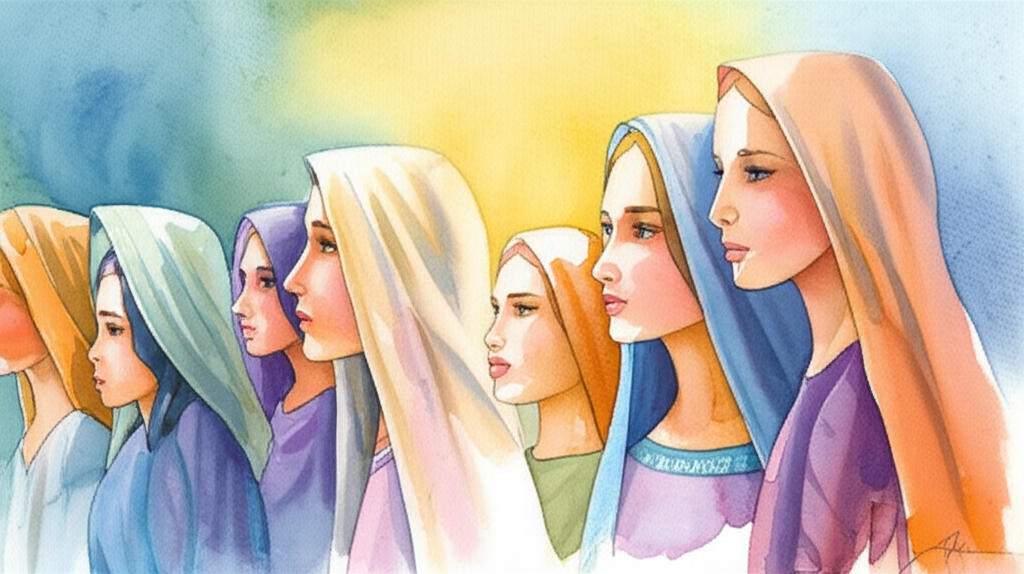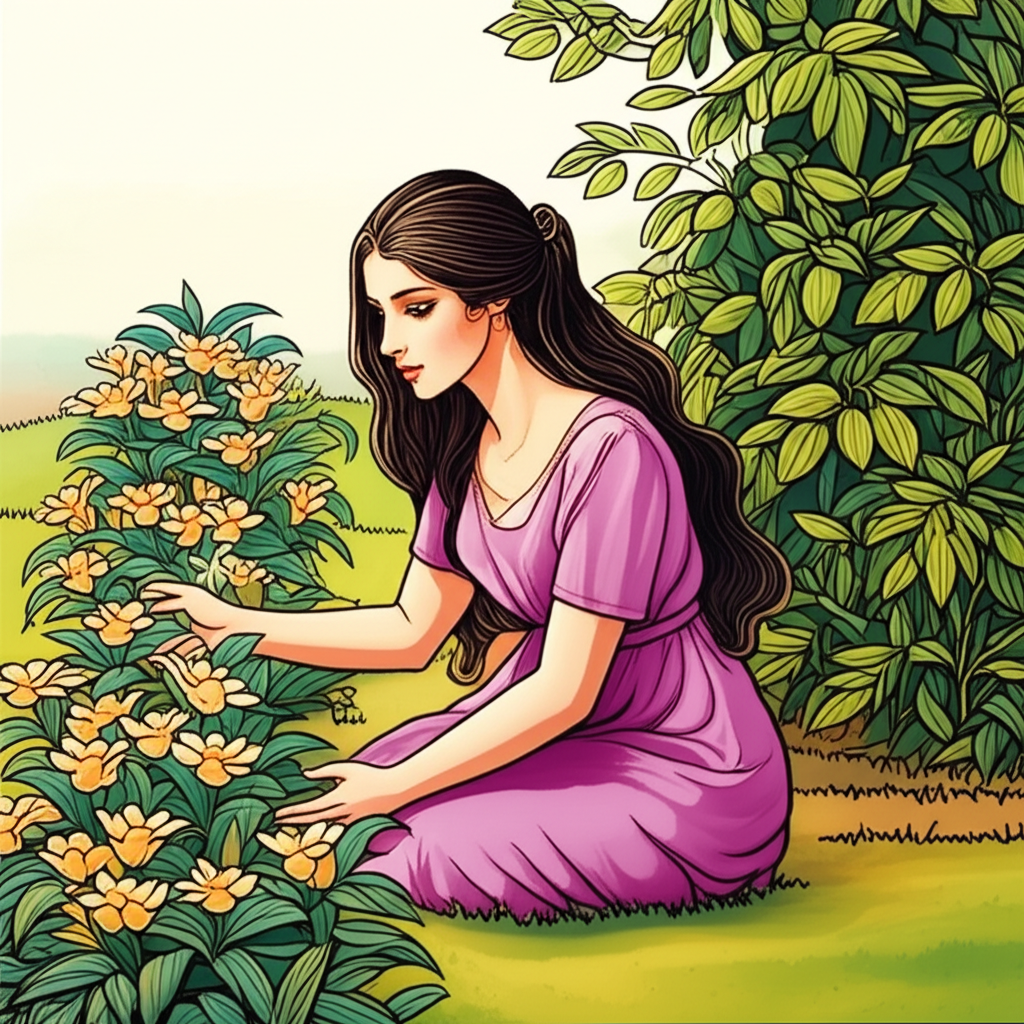Song Of Solomon 6 meaning explained in AI Summary
Chapter 6 of the Song of Solomon continues to explore the themes of love, beauty, and desire. The woman describes her beloved as a vision of beauty, comparing him to a chariot drawn by horses. She expresses her desire for him and her longing to be with him.
The man then appears, describing the woman's beauty in vivid detail, comparing her to a chariot drawn by black stallions. He expresses his intense desire for her and his longing to be with her.
Meaning and Commentary
This chapter reinforces the themes of beauty, desire, and the power of love. The imagery of chariots and horses symbolizes the strength and passion of their love.
- The Beauty of the Beloved: Both the man and woman describe each other as incredibly beautiful, highlighting the physical and emotional attraction between them.
- The Power of Love: The intense desire and longing expressed by both parties demonstrate the transformative power of love.
- The Symbolism of Chariots and Horses: The imagery of chariots and horses symbolizes the strength, power, and passion of their love.
Overall, Chapter 6 of the Song of Solomon continues to celebrate the beauty and intensity of the love between the man and woman, emphasizing the physical, emotional, and spiritual connection they share.
Song Of Solomon 6 bible study ai commentary
The central theme of Song of Solomon chapter 6 is reconciliation and restored communion, which leads to the Beloved's profound praise of the Shulamite's unique beauty and spiritual authority. After a period of separation (Chapter 5), the bride’s renewed confidence in their relationship (vv. 1-3) prompts an outpouring of adoration from the groom. He extols her as uniquely chosen above all others (vv. 8-9) and as possessing an awesome, majestic power, comparing her to a triumphant army (vv. 4, 10). The chapter culminates in her identity being declared as the "Shulamite," the perfect counterpart to Solomon.
Song Of Solomon 6 context
The literary context follows the relational crisis in chapter 5 where the Shulamite delayed in opening the door for her Beloved. This chapter marks the resolution. The dialogue shifts from the Shulamite and the "daughters of Jerusalem" back to the Beloved and the Shulamite. Culturally, gardens were places of delight, intimacy, and fertility. The comparison to Tirzah (a former capital of the northern kingdom of Israel, known for its beauty) and Jerusalem (the holy capital of Judah) represents the highest form of praise for beauty and perfection in the nation. The mention of a royal harem (queens, concubines) was a reality for a king like Solomon, making his declaration of the Shulamite's uniqueness all the more potent. The chapter utilizes a wasf, a common ancient Near Eastern poetic form that describes the physical attributes of a lover.
Song of Solomon 6:1
"Where has your beloved gone, O most beautiful among women? Where has your beloved turned, that we may seek him with you?"
In-depth-analysis
- Shift in Tone: The "daughters of Jerusalem," who previously questioned her (Song 5:9), are now convinced of her Beloved's worth due to her passionate description of him.
- From Mockers to Seekers: Their question changes from "What is your beloved more than another?" to "Where is your beloved?" They now want to join her in her search, signifying the positive influence of her testimony.
- "Most beautiful among women": They affirm the title her Beloved gives her, showing they now see her through his eyes, even in her state of distress. Their view has been transformed by her love for him.
Bible references
- John 4:28-30: "The woman left her water jar... and said to the people, 'Come, see a man who told me everything I ever did...' They came out of the town and made their way toward him." (A testimony inspiring others to seek Christ).
- Ps 42:1-2: "As the deer pants for streams of water, so my soul pants for you, my God." (A shared posture of seeking).
- Ruth 1:16: "Where you go I will go, and where you stay I will stay..." (Commitment to join in the journey).
Cross references
Zech 8:23 (Gentiles seeking God with Jews); Matt 2:2 (Magi seeking the king); John 6:24 (Crowd seeking Jesus).
Song of Solomon 6:2-3
"My beloved has gone down to his garden, to the beds of spices, to pasture his flock in the gardens and to gather lilies. I am my beloved's, and my beloved is mine; he pastures his flock among the lilies."
In-depth-analysis
- Confident Answer: She no longer searches frantically. She knows exactly where he is. Her anxiety from chapter 5 has been replaced by secure faith.
- "His garden": She recognizes the place of fellowship (the garden) is his, and he has gone there to find pleasure and tend to his flock. Allegorically, Christ is always present with His people (the Church, the garden).
- Mutual Possession: "I am my beloved's, and my beloved is mine" is a declaration of restored intimacy and unwavering covenant. This is a reversal of Song 2:16, placing emphasis first on her belonging to him, indicating submission and security found in his ownership.
- "Gather lilies": A term of endearment for her. He is not just tending the garden in general; he has gone to "gather" her specifically.
Bible references
- John 10:27-28: "My sheep listen to my voice; I know them... I give them eternal life, and they shall never perish." (The Shepherd knowing and keeping His flock).
- Gal 2:20: "...the life I now live in the flesh I live by faith in the Son of God, who loved me and gave himself for me." (Mutual indwelling and possession).
- John 15:4: "Remain in me, as I also remain in you..." (The essence of the garden relationship).
Cross references
Song 2:16 (the same refrain); Gen 2:8 (God planted a garden); Isa 58:11 (soul like a watered garden); Eph 5:29 (Christ feeds and cherishes the church).
Song of Solomon 6:4
"You are beautiful as Tirzah, my love, comely as Jerusalem, awesome as an army with banners."
In-depth-analysis
- Extravagant Praise: The Beloved suddenly appears and begins his praise, confirming the restoration of their fellowship.
- Tirzah and Jerusalem: These were two of the most beautiful and significant cities. Tirzah (meaning "delightful") was known for its natural beauty, while Jerusalem represented royal glory and holiness. He is saying she possesses both natural charm and consecrated splendor.
- Word: The phrase
ayummah kannidgalot(awesome as an army with banners) is key.Ayummah: Means terrible, dreadful, or awe-inspiring. It suggests a majesty that commands respect and even fear.Nidgalot: Refers to a military unit under its own standard or banner.
- The Church Militant: Allegorically, this describes the Church. When in right relationship with Christ, she is not weak but is spiritually powerful, organized, and formidable to the forces of darkness.
Bible references
- Ps 48:2: "Beautiful in its loftiness, the joy of the whole earth, like the heights of Zaphon is Mount Zion, the city of the Great King." (Praise of Jerusalem's beauty).
- Eph 6:10-12: "Finally, be strong in the Lord and in his mighty power. Put on the full armor of God..." (The Church as a spiritual army).
- Eph 5:27: "...to present her to himself as a radiant church, without stain or wrinkle or any other blemish, but holy and blameless." (The Church as beautiful and comely).
Cross references
Num 24:5 (How goodly are your tents, O Jacob); 2 Cor 10:4 (weapons of our warfare); Rev 19:14 (armies of heaven following Christ).
Song of Solomon 6:5-7
"Turn away your eyes from me, for they overwhelm me— Your hair is like a flock of goats gliding down Gilead. Your teeth are like a flock of sheep coming up from the washing... Your temples behind your veil are like a slice of a pomegranate."
In-depth-analysis
- Overwhelming Beauty: His statement "turn away your eyes" is hyperbolic, expressing that her focused love and restored beauty are almost too powerful for him to bear.
- Repetition as Affirmation: He repeats verbatim his praises from Song 4:1-3. This is not laziness but reassurance. It tells her that despite the recent conflict, his view of her has not changed. His love is constant and his perception of her beauty is unwavering.
- Consistent Qualities: The praise for her hair (multitude), teeth (purity and uniformity), and temples (hidden fruitfulness) reaffirms the same qualities he valued before the conflict.
Bible references
- Mal 3:6: "I the LORD do not change. So you, the descendants of Jacob, are not destroyed." (God's unchanging character is the basis for our security).
- Heb 13:8: "Jesus Christ is the same yesterday and today and forever." (Christ's feelings for His bride are constant).
- Song 4:1-3: "How beautiful you are, my darling... Your hair is like a flock of goats... your teeth are like a flock of shorn sheep..." (The direct parallel showing consistent love).
Cross references
Num 23:19 (God is not a man that he should lie); Ps 139:14 (fearfully and wonderfully made); Jas 1:17 (every good gift is from the Father of lights, with whom there is no variation).
Song of Solomon 6:8-9
"Sixty queens there may be, and eighty concubines, and virgins beyond number, but my dove, my perfect one, is unique, the only one of her mother, pure to her who bore her. The young women saw her and called her blessed; the queens and concubines also, and they praised her."
In-depth-analysis
- Her Uniqueness: Solomon, a king with a vast harem (1 Kings 11:3), declares her to be utterly unique. The numbers 60 and 80 may be symbolic of completeness, meaning she surpasses all possible rivals.
- Words of Endearment:
Yonati(My dove): Symbolizes gentleness, purity, and loyalty.Tammati(My perfect/undefiled one): Indicates completeness and moral purity. She is wholehearted.
- "One is she": The ultimate statement of exclusive love. In God's eyes, there is only one Bride for His Son.
- Public Acknowledgment: Even her rivals (queens and concubines) and peers (young women) are compelled to praise her. Her unique status is self-evident to all.
Bible references
- Eph 4:4-6: "There is one body and one Spirit... one Lord, one faith, one baptism; one God and Father of all..." (The singular nature of the Church).
- Eph 1:4: "For he chose us in him before the creation of the world to be holy and blameless in his sight." (God's unique choice of His people).
- 1 Pet 2:9: "But you are a chosen people, a royal priesthood, a holy nation, God’s special possession..." (The exclusive identity of the believer/Church).
Cross references
Gal 4:26 (the Jerusalem that is above is free, and she is our mother); Ps 45:9 (the royal bride).
Song of Solomon 6:10
"Who is this that appears like the dawn, fair as the moon, bright as the sun, awesome as an army with banners?"
In-depth-analysis
- Rhetorical Question: This is likely voiced by the observers ("daughters" and "queens") from verse 9. Her appearance is so glorious it evokes a question of awe: "Who is this?"
- Escalating Imagery: Her beauty is compared to escalating celestial lights:
- Dawn (
shachar): Represents new beginnings, hope, and ever-increasing light. - Moon (
levanah): Represents reflected glory, beauty in the darkness. - Sun (
chammah): Represents brilliant, pure, overwhelming glory.
- Dawn (
- Climax of Praise: This verse combines the motifs of light and might. She is both stunningly beautiful and overwhelmingly powerful, a complete picture of the glorified Church.
Bible references
- Rev 12:1: "A great sign appeared in heaven: a woman clothed with the sun, with the moon under her feet..." (The celestial glory of God's covenant people).
- Matt 5:14: "You are the light of the world. A town built on a hill cannot be hidden." (Believers as sources of light).
- 2 Cor 3:18: "And we all... are being transformed into his image with ever-increasing glory..." (The progressive nature of our glorification, like the dawn).
Cross references
Prov 4:18 (path of the righteous is like the morning sun); Isa 60:1 (Arise, shine, for your light has come); Mal 4:2 (sun of righteousness will rise).
Song of Solomon 6:11-12
"I went down to the nut grove to see the blossoms of the valley, to see whether the vine had budded, whether the pomegranates were in bloom. Before I was aware, my desire set me among the chariots of my kinsman, a prince."
In-depth-analysis
- Her Perspective: The Shulamite explains her actions. She was not running away, but simply going about her business, checking on the spiritual "fruit" and growth in the garden (the valley).
- Verse 12 - A Difficult Text: "Before I was aware..." (
Lo yadati nafshi) literally "I did not know, my soul...". This expresses an unexpected, sudden turn of events. - Interpretations of v. 12:
- Ecstatic Rapture: Her longing for her beloved transported her, in spirit, to be with him in his royal splendor ("chariots of Amminadib" or "of my noble people"). Her soul was "carried away" by love.
- Spiritual Readiness: As she was tending to the fruits of the Spirit, she found herself suddenly ready and elevated to a place of honor and intimacy with the King, without striving for it.
- Amminadib: Can be translated "my kinsman, a prince" or "my noble people." The point is the elevation to a royal, swift, and glorious position.
Bible references
- Luke 12:35-37: "Be dressed ready for service and keep your lamps burning... It will be good for those servants whose master finds them watching when he comes." (Readiness leading to sudden honor).
- 2 Cor 12:2-4: "I know a man in Christ who... was caught up to the third heaven. Whether it was in the body or out of the body I do not know..." (Paul's description of a divine rapture).
- Gal 5:22-23: "But the fruit of the Spirit is love, joy, peace..." (The spiritual "blossoms" she went to inspect).
Cross references
Song 7:12 (parallel action of inspecting the vines); Hos 14:5-7 (Israel will blossom); 2 Kgs 2:11 (Elijah taken up in a chariot).
Song of Solomon 6:13
"Return, return, O Shulamite; return, return, that we may look upon you. Why should you look upon the Shulamite, as upon the dance of the two camps?"
In-depth-analysis
- The Name "Shulamite": (
ha-shulammit). This is the first and only time she is named. It is the feminine form of Solomon (Shlomo). It means "the peaceful one" or "the perfected one." She is now identified as his perfect counterpart and complement. - The Call to "Return": The speakers (likely the "daughters" again) want her to come back. They are fascinated and want to gaze (
nachazeh) upon her. Her glorified state is a compelling testimony. - The "Dance of Mahanaim": Her response is a humble question. "Mahanaim" means "two camps" or "two armies."
- Victory Dance: A celebratory dance after a great victory.
- Internal Struggle: A dance depicting the conflict between her two natures (flesh vs. spirit; Romans 7).
- Divine and Human: A dance that reveals her as both a humble country girl and a glorious queen, belonging to both earth and heaven. The watchers are mesmerized by this beautiful, complex, and victorious life.
Bible references
- Gen 32:1-2: "Jacob also went on his way, and the angels of God met him. When Jacob saw them, he said, 'This is the camp of God!' So he named that place Mahanaim." (A place of encountering two camps: Jacob's and God's).
- Rom 7:22-25: "For in my inner being I delight in God’s law; but I see another law at work in me... Who will rescue me from this body that is subject to death? Thanks be to God, through Jesus Christ our Lord!" (The two "camps" warring within the believer).
- Eph 2:6: "And God raised us up with Christ and seated us with him in the heavenly realms..." (The believer's dual reality: living on earth while being spiritually in heaven).
Cross references
1 Cor 4:9 (made a spectacle to the world); Heb 12:1 (surrounded by a great cloud of witnesses).
Song Of Solomon chapter 6 analysis
- The Identity of the Shulamite: The reveal of her name in 6:13 is a climax. As the feminine of Solomon (
Shlomo), it signifies she is his perfectly matched partner, the one who brings his name and nature to completion. He is the King of Peace, and she is the peace-filled one. This speaks to the Church's identity being found entirely in Christ. - The Church Militant and Triumphant: The imagery of the "army with banners" presents the Church not as a passive entity, but as a powerful spiritual force on earth (militant). The celestial imagery ("dawn, moon, sun") points to her glorified, heavenly state (triumphant). Chapter 6 holds these two realities in tension, showing that the glorified state is what gives the earthly army its awesome power.
- The Garden Trajectory: This chapter fits into a biblical motif of sacred gardens. It begins in the garden of Eden (fellowship lost), continues here in the garden of Solomon (fellowship restored), points to the garden of Gethsemane (fellowship redeemed through agony), and culminates in the garden of the New Jerusalem (fellowship perfected, Rev. 22:1-2), where the Tree of Life is fully accessible.
- Growth through Trial: The conflict of Chapter 5 was necessary for the deeper praise and security of Chapter 6. The Shulamite’s brief loss of communion led her to a more profound understanding of her Beloved and a more secure sense of her own identity in his love. This mirrors the Christian principle that trials produce perseverance, character, and hope (Rom 5:3-5).
Song Of Solomon 6 summary
Following a period of separation, the Shulamite reaffirms her unwavering security in her Beloved’s love. In response, he erupts in praise, extolling her beauty as superior to all others and as powerful as a majestic army. Her radiant glory is compared to the dawn, moon, and sun, establishing her unique and awesome identity, which culminates in her being named "the Shulamite," Solomon's perfect counterpart.
Song Of Solomon 6 AI Image Audio and Video









Song Of Solomon chapter 6 kjv
- 1 Whither is thy beloved gone, O thou fairest among women? whither is thy beloved turned aside? that we may seek him with thee.
- 2 My beloved is gone down into his garden, to the beds of spices, to feed in the gardens, and to gather lilies.
- 3 I am my beloved's, and my beloved is mine: he feedeth among the lilies.
- 4 Thou art beautiful, O my love, as Tirzah, comely as Jerusalem, terrible as an army with banners.
- 5 Turn away thine eyes from me, for they have overcome me: thy hair is as a flock of goats that appear from Gilead.
- 6 Thy teeth are as a flock of sheep which go up from the washing, whereof every one beareth twins, and there is not one barren among them.
- 7 As a piece of a pomegranate are thy temples within thy locks.
- 8 There are threescore queens, and fourscore concubines, and virgins without number.
- 9 My dove, my undefiled is but one; she is the only one of her mother, she is the choice one of her that bare her. The daughters saw her, and blessed her; yea, the queens and the concubines, and they praised her.
- 10 Who is she that looketh forth as the morning, fair as the moon, clear as the sun, and terrible as an army with banners?
- 11 I went down into the garden of nuts to see the fruits of the valley, and to see whether the vine flourished and the pomegranates budded.
- 12 Or ever I was aware, my soul made me like the chariots of Amminadib.
- 13 Return, return, O Shulamite; return, return, that we may look upon thee. What will ye see in the Shulamite? As it were the company of two armies.
Song Of Solomon chapter 6 nkjv
- 1 Where has your beloved gone, O fairest among women? Where has your beloved turned aside, That we may seek him with you?
- 2 My beloved has gone to his garden, To the beds of spices, To feed his flock in the gardens, And to gather lilies.
- 3 I am my beloved's, And my beloved is mine. He feeds his flock among the lilies.
- 4 O my love, you are as beautiful as Tirzah, Lovely as Jerusalem, Awesome as an army with banners!
- 5 Turn your eyes away from me, For they have overcome me. Your hair is like a flock of goats Going down from Gilead.
- 6 Your teeth are like a flock of sheep Which have come up from the washing; Every one bears twins, And none is barren among them.
- 7 Like a piece of pomegranate Are your temples behind your veil.
- 8 There are sixty queens And eighty concubines, And virgins without number.
- 9 My dove, my perfect one, Is the only one, The only one of her mother, The favorite of the one who bore her. The daughters saw her And called her blessed, The queens and the concubines, And they praised her.
- 10 Who is she who looks forth as the morning, Fair as the moon, Clear as the sun, Awesome as an army with banners?
- 11 I went down to the garden of nuts To see the verdure of the valley, To see whether the vine had budded And the pomegranates had bloomed.
- 12 Before I was even aware, My soul had made me As the chariots of my noble people.
- 13 Return, return, O Shulamite; Return, return, that we may look upon you! What would you see in the Shulamite? As it were, the dance of the two camps?
Song Of Solomon chapter 6 niv
- 1 Where has your beloved gone, most beautiful of women? Which way did your beloved turn, that we may look for him with you?
- 2 My beloved has gone down to his garden, to the beds of spices, to browse in the gardens and to gather lilies.
- 3 I am my beloved's and my beloved is mine; he browses among the lilies.
- 4 You are as beautiful as Tirzah, my darling, as lovely as Jerusalem, as majestic as troops with banners.
- 5 Turn your eyes from me; they overwhelm me. Your hair is like a flock of goats descending from Gilead.
- 6 Your teeth are like a flock of sheep coming up from the washing. Each has its twin, not one of them is missing.
- 7 Your temples behind your veil are like the halves of a pomegranate.
- 8 Sixty queens there may be, and eighty concubines, and virgins beyond number;
- 9 but my dove, my perfect one, is unique, the only daughter of her mother, the favorite of the one who bore her. The young women saw her and called her blessed; the queens and concubines praised her.
- 10 Who is this that appears like the dawn, fair as the moon, bright as the sun, majestic as the stars in procession?
- 11 I went down to the grove of nut trees to look at the new growth in the valley, to see if the vines had budded or the pomegranates were in bloom.
- 12 Before I realized it, my desire set me among the royal chariots of my people.
- 13 Come back, come back, O Shulammite; come back, come back, that we may gaze on you! Why would you gaze on the Shulammite as on the dance of Mahanaim?
Song Of Solomon chapter 6 esv
- 1 Where has your beloved gone, O most beautiful among women? Where has your beloved turned, that we may seek him with you?
- 2 My beloved has gone down to his garden to the beds of spices, to graze in the gardens and to gather lilies.
- 3 I am my beloved's and my beloved is mine; he grazes among the lilies.
- 4 You are beautiful as Tirzah, my love, lovely as Jerusalem, awesome as an army with banners.
- 5 Turn away your eyes from me, for they overwhelm me ? Your hair is like a flock of goats leaping down the slopes of Gilead.
- 6 Your teeth are like a flock of ewes that have come up from the washing; all of them bear twins; not one among them has lost its young.
- 7 Your cheeks are like halves of a pomegranate behind your veil.
- 8 There are sixty queens and eighty concubines, and virgins without number.
- 9 My dove, my perfect one, is the only one, the only one of her mother, pure to her who bore her. The young women saw her and called her blessed; the queens and concubines also, and they praised her.
- 10 "Who is this who looks down like the dawn, beautiful as the moon, bright as the sun, awesome as an army with banners?"
- 11 I went down to the nut orchard to look at the blossoms of the valley, to see whether the vines had budded, whether the pomegranates were in bloom.
- 12 Before I was aware, my desire set me among the chariots of my kinsman, a prince.
- 13 Return, return, O Shulammite, return, return, that we may look upon you. He Why should you look upon the Shulammite, as upon a dance before two armies?
Song Of Solomon chapter 6 nlt
- 1 Where has your lover gone,
O woman of rare beauty?
Which way did he turn
so we can help you find him? - 2 My lover has gone down to his garden,
to his spice beds,
to browse in the gardens
and gather the lilies. - 3 I am my lover's, and my lover is mine.
He browses among the lilies. - 4 You are beautiful, my darling,
like the lovely city of Tirzah.
Yes, as beautiful as Jerusalem,
as majestic as an army with billowing banners. - 5 Turn your eyes away,
for they overpower me.
Your hair falls in waves,
like a flock of goats winding down the slopes of Gilead. - 6 Your teeth are as white as sheep
that are freshly washed.
Your smile is flawless,
each tooth matched with its twin. - 7 Your cheeks are like rosy pomegranates
behind your veil. - 8 Even among sixty queens
and eighty concubines
and countless young women, - 9 I would still choose my dove, my perfect one ?
the favorite of her mother,
dearly loved by the one who bore her.
The young women see her and praise her;
even queens and royal concubines sing her praises: - 10 "Who is this, arising like the dawn,
as fair as the moon,
as bright as the sun,
as majestic as an army with billowing banners?" - 11 I went down to the grove of walnut trees
and out to the valley to see the new spring growth,
to see whether the grapevines had budded
or the pomegranates were in bloom. - 12 Before I realized it,
my strong desires had taken me to the chariot of a noble man. - 13 Return, return to us, O maid of Shulam.
Come back, come back, that we may see you again. Young Man
Why do you stare at this young woman of Shulam,
as she moves so gracefully between two lines of dancers?
- Bible Book of Song Of Solomon
- 1 The Bride Confesses Her Love
- 2 The Bride Adores Her Beloved
- 3 The Bride's Dream
- 4 Solomon Admires His Bride's Beauty
- 5 The Bride Searches for Her Beloved
- 6 Together in the Garden of Love
- 7 The Bride Gives Her Love
- 8 Longing for Her Beloved